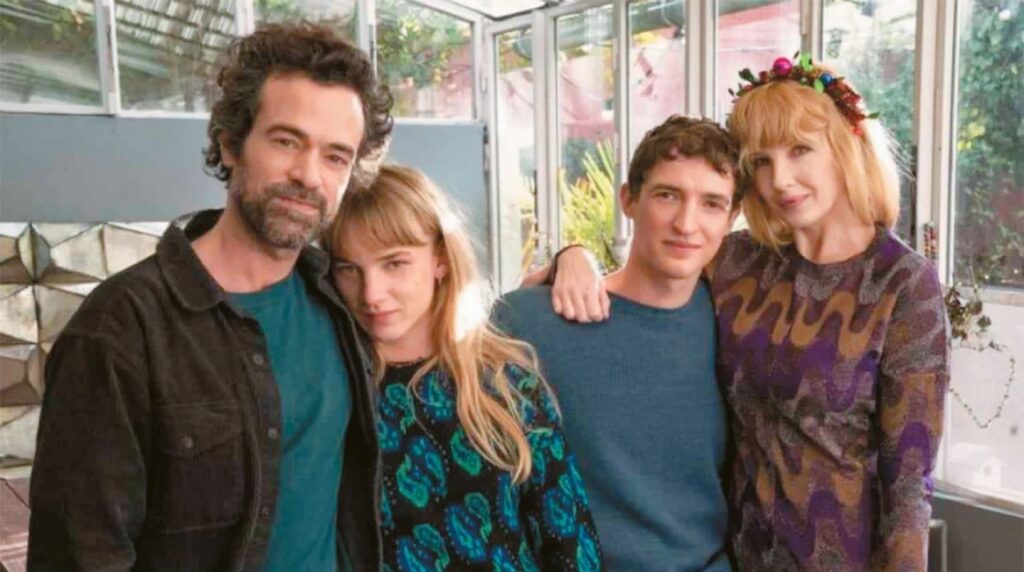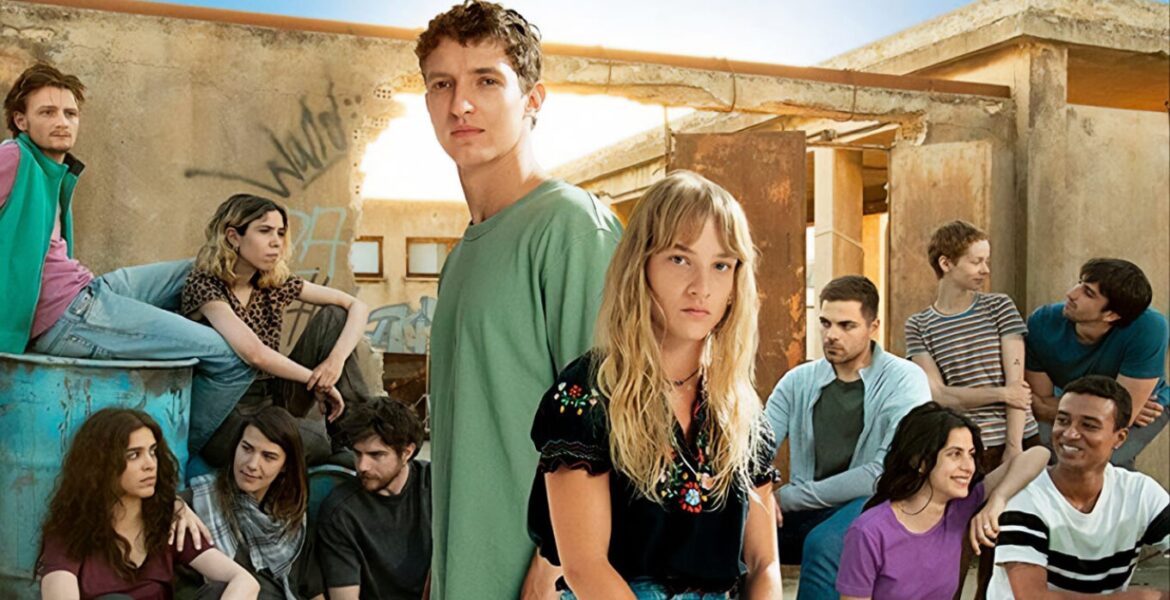“Salade Grecque” (Greek Salad) is the title of Amazon’s new, successful French series, which in its few days of airing has won over the public who see another side of Athens, more real and modern, with its contradictions and its strange beauty.
This is described through the eyes of the two young protagonists, Tom (Aliosha Schneider) and Mia (Megan Northam).
The French critics who managed to see it, welcomed it with particular warmth, speaking in the best words about the modern way of filming Athens by the French team of directors Cédric Klapisch, Lola Doillon and Antoine Garceau, whom we saw on the very successful Netflix series “Call my agent.”
In this series of eight episodes with the inventive title “Salade Greque”, the Greek capital seems to play a leading role, far from the touristic prejudices and preconceived logic of other films.

The series
Twenty years after his iconic film “L’ Auberge Espagnole” which had Barcelona as a background and was the basis for Cédric Klapisch to shoot his two next films – about Moscow with “Russian Dolls” (Les Poupées russes) and about New York’s Chinatown with “Casse-tête Chinois” – effectively completing a trilogy about life in these well-known megacities, viewers enjoy a different series about Athens.
See the trailer:
This time by his side, Klapisch has the whole team of “Call my agent” and a multitude of Greek and French actors, who worked together harmoniously and as they stated in ideal conditions, filming in various corners of Athens where they unfold the adventures of the protagonists.
So if in the films of the trilogy and specifically in “L’ Auberge Espagnole” the young protagonists represented the then active generation of students who traveled through the Erasmus programs developing ties and getting to know other cities.
The children of Javier (played by Romain Duris, who we meet again in “Salade Grecque”) and Wendy (played by Kelly Reilly ) decide to live similar experiences, but this time the worries about the future have rather to do with technology, the philosophical quests that are somewhat entangled with the ancient Greek philosophers under the shadow of the Acropolis and bring to light all the contemporary issues, from immigration to globalisation and the gentrification that now seems to be hitting Athens as well.

The story
Specifically, the son of Javier and Wendy, who seems to exude an air of New York, which he leaves in search of funding for his startup company, clashes with his non-conformist sister, who is, before him, in the Greek capital with the willingness to share common experiences with the rebellious youth of the city.
Although completely different characters, the two siblings, who essentially seem to represent the two diametrically opposite aspects of youth and modern cities, come to share common experiences and anxieties in today’s Athens.
The difference in characters also has to do with the French-Spanish father and the British mother, who now live separately, proving that these two worlds have always been at odds, long before the Brexit era.
The two siblings finally meet in Athens after the news that they inherited a property from their grandfather, which he had bought years ago shortly after the fall of the junta.
This is exactly why Tom arrives in Athens to discover that the now half-demolished building is inhabited by young people from different directions and with different origins, which gives the director the opportunity to finally make his own “salad” with international colours and character.
In this colourful merry-go-round that aims to highlight multiculturalism, are added the anxieties of Tom’s sister, the perpetually angry Mia, who now seems to have become radicalised by participating in occupations and uprisings, living an intense relationship with a Greek anarchist (the which is beautifully interpreted by our own Dimitris Kitsos, who has begun to take on his own “international air” since his departure from “Maestro”).
After all, it was his own idea to establish an NGO for the facilitation of refugees, in which Mia appears to be employed, at the same time participating in all the protests that take place in Athens.
Together they live in the squat, which the police undertake to evacuate at some point, giving the director the opportunity to show scenes reminiscent of various real ones we have seen taking place in the centre of Athens.

Despite the riots, of course, that the series describes, there is no lack of the comic element, which comes precisely from the different identity that each of the protagonists supports and their somewhat “exotic” look since, after all, they are foreigners which appropriate different aspects of Athens in their own way.
Somewhere there, between the tourist version of the city, its philosophical identity due to its ancient Greek past and the political unrest, a modern image is established that makes the viewer love Athens, as well as its inhabitants, precisely through the contradictions, the modern problems and their dead ends.
In other words, the city is shown as the one we know today and it may be the first time that it is shown in this real, punk, subversive but also tender way by a foreign director.
The Athens Film Office
Nothing to do, that is, with the image of a harsh and ugly metropolis, where the chaos described by the foreign film “Beckett”, which we had the misfortune to see on Netflix only to find out that our country had financed a film that only aimed to discredit its modern image.
This time the Athens Film Office, which was responsible for the filming and the happy ending of the series, made sure that the foreign version of Athens is what one expects without straying from reality.
Fortunately, “Salade Grecque”, despite its realism, films a modern multicultural metropolis, which is now reconciled, like the inhabitants, with its different aspects.
Even the ugly graffiti that dominates everywhere in the city, look like elements of a colourful decor, sometimes closer to Berlin and sometimes to Detroit, as one of the film’s protagonists characteristically describes at one point.
Be that as it may, the director seems to have done a lot of work in the script capturing the different aspects of the story in relation to the different aspects of Athens: the most beautiful and “ancient Greek” neighbourhood of Thisio, the aggressive of Metaxourgeio, the most contemporary Neos Kosmos, and the most unexpected in Gazi.

An important role has been played at this point by the director of photography who uniquely highlights the images, but also by the Greek casting director Makis Gazis, who has done an excellent job in choosing the actors.
After all, he himself plays a small role as a tour guide who appears against the backdrop of the Parthenon telling the story of the Acropolis. Makis Gazis is responsible for the wonderful Greek and foreign cast, who seem to have a unique chemistry.

A city taken from the future
In order, in fact, to render this contemporary profile and to vividly capture the dialogues between young people, the director Cédric Klapisch consulted Greeks and foreigners living in the city forming a whole team of young people up to 30 years old who all worked along with the script.
“With the contribution of all of them, it was possible to record contemporary youth concerns,” the 61-year-old filmmaker said in an interview with a French newspaper, who emphasised: “I didn’t want my own thoughts to be conveyed about how young people work today, but their real experiences”.
That’s why the people in charge of the series relied a lot on the improvisations and the problematic of each protagonist, asking them to add their own version around the character they were asked to interpret so that the result seems even more realistic.
Besides, as the protagonists of the series stated in the French media, “Salade Grecque” describes a lively city with new residents who are much more suspicious and much more aware than in the past, much more actively involved in the city’s happenings.
He characteristically wrote a review of the series in one of the many French publications and websites that seem to have been delighted with the result: “At this crossroads of economic and political stakes, the city of Athens presents itself as an ideal setting.”
“A unique destination for students as well as for foreign residents, the Greek city welcomes all this new musical and artistic wave that is being born in Europe today, just as it was with Berlin twenty years ago,” he added.
After all this, it seems we have many reasons to (again) love Athens, even through the eyes of foreigners, even enjoying a cool and delicious “Salade Grecque”.
READ MORE: Poor Things: The first photos of Emma Stone as “Bella” in the new film by Yorgos Lanthimos.


